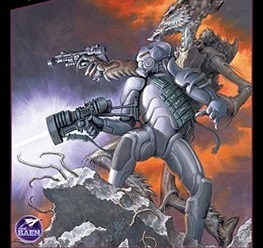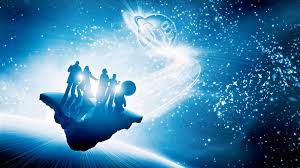
Ready for a brief story in irony and also, somewhat, in superficiality? A month or two ago, I picked up a copy of The Thirteen Gun Salute – one of the many “Maturin/Aubrey” novels by Patrick O’Brian. These are better known as the “Master and Commander” series of which a movie was made starring Russell Crowe. Anyway, I had decided to read at least one of them because I’ve seen them everywhere.
Well, I read roughly forty percent of the novel and put it down. The surplus of nautical terms and places and people and—I don’t know, except that it wasn’t for me. I confess there are readers who find that level of detail enthralling. I’m simply not one of them.
Since I usually don’t give up on many books, I needed to dive back into something fresh right away. Because I liked the cover illustration, I snatched an omnibus copy of David Drake’s The Reaches Trilogy. Nothing like a little science fiction junk food to clear my head.
I began reading the first novel in the series Igniting the Reaches, but to my subtle consternation, I couldn’t help thinking that The Thirteen Gun Salute had made a kind of lasting impression on me because the events in this trek through space struck me as similar to those of Jack Aubrey and Stephen Maturin. Well, halfway through, I did something I often do at the end of books. I looked up David Drake’s bio on his website and Wikipedia. Turns out, David Drake specifically cites being inspired by the Aubrey-Maturin series in his own writing. In fact, The Reaches is actually supposed to mirror some of Sir Francis Drake’s voyages. What are the chances?
My superficiality in judging a book by its cover (even positively) had created a predicament. But I wasn’t about to abandon a second successive novel. I pressed on, and although pirating and/or Napoleon-esque privateering aren’t my favorite subjects, I wasn’t disappointed. I wasn’t blown away either, but I will say that Drake did enough world building to pique my interest for its eventual explanation in the sequels. I just hope he does explain (more on that in a future post). So while sea (or space) jargon can be off-putting (dare I say, even burdensome), it is consistent to the setting, the characters, and the characters’ actions. A lot of reading is about expectations—expect the wrong thing and you might end up dissatisfied. It’s an odd psychological game we, as readers, play with writers (“surprise me! …but not too much”). So let me set some general expectations should you choose to read Igniting the Reaches: Essentially its the Age of Discovery (in space) where Piet Ricimer and Stephen Gregg are cutthroat merchants intending to strike it rich by harvesting valuable microchips from various planets. They use about any means necessary including capturing and selling members of an alien race, or hiring the smartest of that race to work for them. Deadly battles with rival merchants ensue. At its core, however, this novel wrestles with questions of morality (and the suspension of it) at the expense of wealth and advancement.
If you’re into military sci-fi, give it a shot (pun intended). 3/5 stars.



